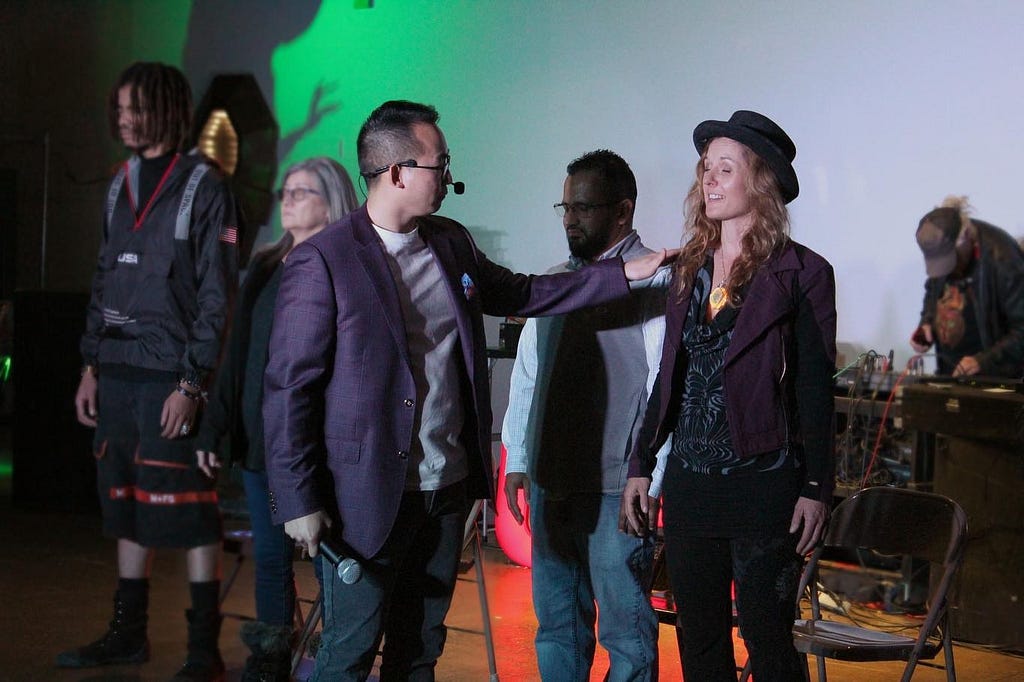An Interview With Wanda Malhotra
Passion — You must be passionate about being sober, so much so that you want to take action. My past clients had the desire to do more with their significant other and family as that driving factor.
In a world where the journey towards sobriety is often challenging and deeply personal, understanding the pathways and strategies for achieving and maintaining sobriety is crucial. This series aims to provide insight, encouragement, and practical advice for those who are on the road to recovery, as well as for their loved ones and support networks. As a part of this series, I had the distinct pleasure of interviewing Fred Lee.
Fred is a Meta-Thinking Expert, US Army Veteran, and Award Winning Hypnotist. He has consulted and spoke for organizations in 4 different continents. He is known to amaze and educate people about optimizing the problem solving process.
Thank you so much for joining us! Before we dive in, our readers would love to “get to know you” a bit better. Can you tell us a bit about your ‘backstory’?
I was a former United States Army Officer, Award winning hypnotist, and magician. I served in the army reserves after university while performing for people all around the world as a magician and hypnotist. My passion for entertainment and psychology gradually merged into my career as a Meta-Thinking Expert. I apply my psychology degree by appearing at different conferences and meetings educating people through entertainment. I consult individuals and organizations in ways to better optimize their problem solving assets.
Can you share with us the most interesting story from your career? Can you tell us what lessons or ‘takeaways’ you learned from that?
I was at a corporate event booked to do my presentation. It was after the show where I mingled and interacted with the group. I was challenged to hypnotize a French man with a PhD since he claimed he couldn’t be hypnotized. It wasn’t even a challenge since I had him think he was Beyoncé prancing around the room.
We can all agree that in most circumstances, people would freeze and stumble when facing a problem. By applying Meta-Thinking principles and looking beyond the scope of what that problem is, you can create miracles in what others perceive as an impossible situation.
You are a successful individual. Which three character traits do you think were most instrumental to your success? Can you please share a story or example for each?
The following three traits that I have are discipline, tenacity, and passion.
Without some form of discipline like having a general work schedule or a set of protocols, how can you expect to be laser focused at the task at hand?
Tenacity is what helps drive discipline since the desire to never give up allows for more opportunities to fall in your lap.
And passion is the driving factor for all the other traits. If you don’t love what you do, do you honestly think that your work will be sustainable? I love my work. And because of that love for it, I aim to build my career in my image using the essential tools I need.
This intertwined trifecta was created looking through the meta-thinking lens.
Are you working on any exciting new projects now? How do you think that might help people?
I’m in the works of a book. It’ll be a long-term project that has the aim to educate the public regarding the human mind. Don’t want to spoil too much.
Ok, thank you for all that. Now let’s shift to the main focus of our interview. How would you advise individuals who are contemplating the journey to sobriety but might be hesitant or unsure about taking the first step? Are there key considerations or strategies that can make this initial phase more manageable?
Ask yourself what you’re expectations are. Knowing what you want is important when creating a road map to sobriety. The easiest way to organize those milestones formed by those expectations would be to get someone you really trust. Being comfortable with pushing yourself while having a safety net like a beloved family member or friend will make the journey not feel like you’re free-climbing up a mountain.
Sobriety often comes with its unique set of challenges. Can you share insights on how individuals can effectively navigate obstacles or triggers that may arise during their journey? Are there specific tools or support systems that you find particularly helpful in overcoming these challenges?
That safety net/accountability buddy I mentioned earlier comes into play. Having someone you trust to know what can trigger you and guide you in the right direction is crucial every step of the way. Positive reinforcement allows for the brain to be trained more effectively and is the ideal method in this journey. Having things you like when sober is the best reward to train yourself with.
Maintaining sobriety is a long-term commitment. From your experience, what are the essential factors that contribute to the sustained success of individuals on this journey? Are there lifestyle adjustments or mindset shifts that prove crucial for the ongoing pursuit of sobriety?
The expectations at the beginning of the journey with the accountability buddy are the biggest factors to long-term success. An accountability group is even better. Having this as the foundation aids in your mindset readjustments. Most people don’t set milestones and lack someone to hold them accountable all the time. It’s a matter of understanding what you can handle, go at a reasonable pace, and reach each of the little milestones along the way. The three traits I mentioned earlier apply here: Passion, Tenacity, and Discipline. By being passionate about changing your life for the better, using that tenacity to create and follow through with a disciplined lifestyle, you can really see the results.

Based on your research or experience, can you please share your “5 Things You Need To Begin, Navigate, & Sustain Sobriety”?
1 . Passion — You must be passionate about being sober, so much so that you want to take action. My past clients had the desire to do more with their significant other and family as that driving factor.
2 . Buddy up — Find someone and several others you can trust to help you on your journey. They will help you see the bigger picture. You know very well how good friends and family can tell you how others see you.
3 . Discuss — Go over your expectations, develop milestones, see what your strengths and weaknesses are, and find ways to ensure you stay on your path by having contingency plans. One client of mine went to the extreme of having his wife go on a date with him at every milestone he reached.
4 . Plan — Put together the steps you need to take to get to sobriety. Every action you choose to do will influence how fast your progress will be. Simple things like making your bed, brushing your teeth, a simple checklist is fine if that’s your preferred method.
5 . Execute — Go out and do it. You can’t make changes if you don’t take that first step. Taking that leap of faith isn’t so much of a leap of faith when it is calculated and all possibilities are accounted for via the steps above.
Community support plays a vital role in the journey to sobriety. How can individuals find and engage with supportive communities or resources that align with their specific needs and goals? Are there online platforms, local groups, or initiatives that you recommend for fostering a sense of connection and understanding during this process?
Speaking with someone you trust will allow you to comfortably begin to find and engage with support groups. They can recommend people and groups that they know would help you best based on your discussion with them. A simple online search can help you find certain groups, however visiting your doctor and having them recommend some resources is pretty surefire in case your personal and online resources don’t fit your needs. Online forums exist but be wary of them since you can run into forums that lead you down the rabbit hole of detriment after detriment towards your progress.
What is the best way for our readers to continue to follow your work online?
Sign up to my email list. It includes a free gift: fredleemind.com/welcome
You can also follow my social media @fredleemind
This was very inspiring. Thank you so much for the time you spent on this. We wish you only continued success.
About the Interviewer: Wanda Malhotra is a wellness entrepreneur, lifestyle journalist, and the CEO of Crunchy Mama Box, a mission-driven platform promoting conscious living. CMB empowers individuals with educational resources and vetted products to help them make informed choices. Passionate about social causes like environmental preservation and animal welfare, Wanda writes about clean beauty, wellness, nutrition, social impact and sustainability, simplifying wellness with curated resources. Join Wanda and the Crunchy Mama Box community in embracing a healthier, more sustainable lifestyle at CrunchyMamaBox.com.
Fred Lee On How to Begin, Navigate, & Sustain Sobriety was originally published in Authority Magazine on Medium, where people are continuing the conversation by highlighting and responding to this story.


